Even before the coronavirus crisis hit, many of us were starting to think harder about how we spent our money. Now, with incomes squeezed for some and the pandemic putting the spotlight on the most vulnerable sections of society, there is even more cause to consider where your cash is going.
Here we look at some simple switches you can make and the retailers that use your money for good, or run their operations in a sustainable way. From teabags to toilet roll, via a move to a greener energy firm, we have focused on everyday spending. The list is not exhaustive but you may find there are some small changes you can make that will help your money make a positive impact.
Let us know who we have missed – you can email us at money@theguardian.com – and we will feature your favourites at a later date.
Household goods

The drive to reduce single-use plastics everywhere in our lives appears to have taken a back seat as a result of the coronavirus, particularly in fresh food as a result of fears about contamination.
Arguably one of the most ambitious attempts yet, Loop – already established in the US and France – is undergoing a trial in the UK. Launched by the recycling giant TerraCycle in partnership with Tesco, it is backed by consumer goods companies such as Unilever and PepsiCo, who have created refill versions of popular brands – including Coca-Cola, Heinz and Persil – to sell via the website.
Customers can place online orders for goods that normally come in single-use plastic packaging. These are delivered instead in refillable containers that can be collected from the doorstep and cleaned for reuse up to 100 times.
Prices are comparable to the equivalent plastic container – slightly more for the own-brand Nevoli range for pasta and olive oil, etc – but with returnable deposits for the refillable containers.
Using vegan-friendly refillable liquid concentrate and a “circular economy” model, Splosh is a range of laundry detergents, fabric conditioners, washing-up liquids, dishwasher tablets, kitchen cleaners and handwashes – all using highly concentrated refillable liquid delivered through the post.
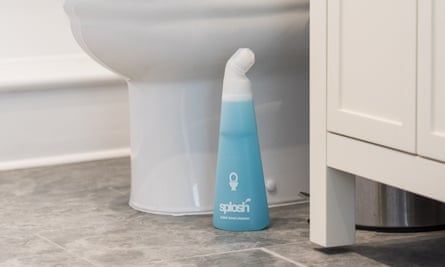
Customers can use their own bottles or order them (filled) from the company. The pouches containing refills are recycled and made into useful products such as scrapers and ice-cream scoops when they are returned by customers for free.
The company is launching gift vouchers later this month, so parents may want to give it to their kids who are away at university, etc. A £10 voucher buys £15 worth of products.
A subscriber to Splosh can buy its value kitchen cleaner for 18p per 100ml. This is compares with the Tesco eco active kitchen cleaner priced at 20p per 100ml and the Waitrose ecological cleaner at 40pm per 100ml.
Who Gives a Crap is an online loo roll, kitchen towel and tissue company that has lots to recommend it: there is no plastic packaging; you can choose between 100% recycled paper or sustainably planted bamboo; 50% of the company’s profits go to providing toilets in developing countries; and the individually wrapped rolls are actually pretty. This year the firm has given £3.2m to charities specialising in building toilets and improving sanitation around the world.
You pay more than for the average pack of loo roll: currently the best-value deal is 48 rolls of the recycled paper version for £36. They are longer than standard – it works out at 18.8p for 100 sheets, which compares with 15p for Tesco’s own-brand version when bought in a pack of 24, and 17p for the supermarket’s eco product. There is also a deal at the moment offering £5 off if you recommend a friend who places an order.
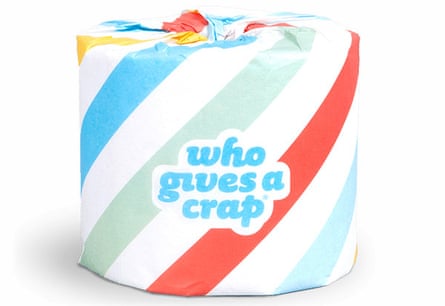
Serious Tissues – a 100% recycled toilet paper brand with no plastic packaging – launched in the UK in April. All its profits are donated in aid of NHS Charities Together to help support NHS staff, volunteers and patients affected by Covid-19.
Set up by the people behind Change Please, a UK social enterprise that helps homeless people off the street by training them as coffee baristas, consumers can choose between a box of 36 standard toilet rolls for £24 or the premium, softer version (generally sold out) for £28. Both work out cheaper with a subscription.
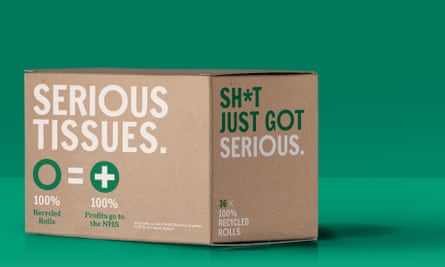
Cheeky Wipes makes a range of cloth-based items, designed to replace disposable cotton wool, wipes, sanitary pads and tampons. People looking for a sustainable alternative can buy baby wipes in a range of colours and patterns, including those made from microfibre or bamboo; reusable toilet roll; cloth makeup remover pads and lace-trimmed period pants in a variety of styles.
The company estimates that its sales since 2016 mean that 40m disposable period products and 25m packets of disposable baby wipes have been saved from landfill.
A baby wipes kit costs from £26.95 but the company estimates that it will have paid for itself after six to eight weeks.
The cult New Zealand brand Ethique claims to be the world’s first zero-waste beauty company, with its solid bars – everything from shampoo and conditioner to deodorant and face scrub – formulated without water and available in handy travel as well as full-sizes. The company says they last up to six times longer than bottled alternatives. These are on sale at Holland & Barrett and Boots. Shipments are experiencing some delay because of the coronavirus, however.
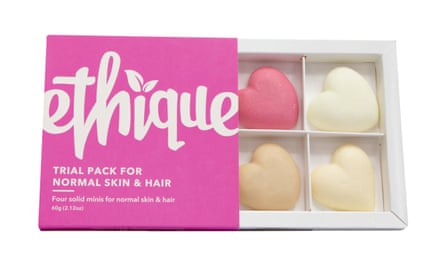
Charity shops are a great first port of call if you want to buy furniture or other household items – as well as helping a good cause you are saving items from landfill. British Heart Foundation has 200 big stores dedicated to home furnishings and an online shop which stocks all kinds of household goods. In store, sofas typically go for £100 or £120, and dining tables for £20. At its eBay shop there are thousands of items on sale including, at the time of writing, 4k Ultra HD 49-inch TVs at £150, antique Singer sewing machines at £33 and exercise bikes for £15. Sue Ryder has an online shop selling new furniture for inside and out, including a garden sofa set made from recycled plastic.

Food & drink
If there is a better brand to buy your vegetarian wholefoods and other staples from, Guardian Money is yet to find it. For 40 years Suma has been run as a co-operative in West Yorkshire, meaning there are no bosses, and all the 200 staff receive the same pay, irrespective of the job they have done that week.
It is a food wholesaler, meaning that most people will have to buy its products from their local health food shop or similar. The products are of high quality and are sustainably produced. For example, only 30 of the 1,300 Suma own-brand products contain palm oil. If you can get together a group of friends to buy £375 worth, you will meet their minimum-order size. In return, you will be given a 32.5% wholesale discount, although you will need somewhere to split the load once it arrives – possibly delivered by the marketing director, as staff take their turn behind the wheel.
Coaltown is a speciality coffee roastery that strives to bring jobs and vitality back to Ammanford, south Wales, a former mining community whose local economy has struggled since the last of the collieries was closed in 2003. The founders say their ambition is to bring industry back to their home town.
Coaltown prides itself on building sustainable working relationships with farmers from across the world’s major coffee growing regions, including direct links with farmers in Uganda’s renowned Kisinga coffee station.
Achieving such lofty aims doesn’t come cheap, though: a 227g bag of Coaltown’s staple Black Gold espresso will set you back £8 but by setting up a subscription you can save 40% (£3.20) on your first order and 5% (40p) on all subsequent orders.

The (obsolete) word Manumit means to release from slavery and that is what this Cardiff-based roastery is aimed at, by offering training and eventually employment to survivors of modern slavery. It sources sustainable, slavery-free coffee from around the world and strives to ensure that all the farmers it works with are well-paid and fairly treated.
In addition, all its profits are invested in local and global anti-slavery initiatives.
The standard house roast costs £8 for 250g while the Peruvian premium roast – complete with notes of vanilla, cherry and milk chocolate – costs £10. Repeat customers can save up to 20% through a subscription service.
Teapigs is a Brentford-based tea company that uses sustainable materials to eliminate the need for plastic in either its packaging or the bags. It was the first tea company awarded the plastic-free trust mark from A Plastic Planet.
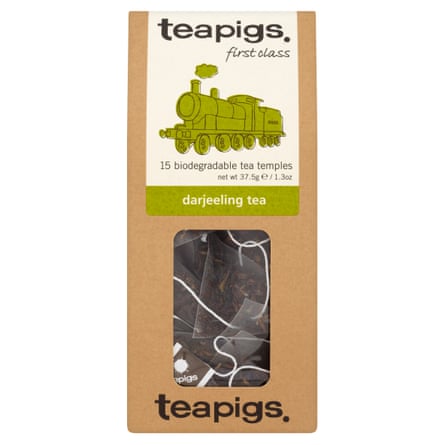
Owned by Tata Group, most of the tea for its signature everyday brew (£3.99 for 15 bags) comes from Gisenyi, Rwanda, and it works with the Point Foundation, which helps orphans and vulnerable young people in the area access education. A subscription service offers a 10% discount on each purchase.
For beer drinkers, Ardbeg, the malt whisky distillery on Islay, has just produced its first beer, with all the profits donated to support clean water projects in Malawi.
Shortie Smoky Porter uses Ardbeg’s peated malt and was brewed by the Williams Bros brewery in Alloa. It was created as part of Brewgooder’s wider Global Gathering campaign for a collaborative brewing project to provide clean water for 100,000 people in developing countries. It is available from ardbeg.com and selected retailers, £14 for a four-pack, but once it’s gone, it’s gone.
Going from strength to strength is Toast Ale, launched four years ago by Tristram Stuart, the founder of the food waste charity Feedback. Stuart was inspired to use leftover bread (it replaces a third of malted barley) to make beer, and all distributable profits go to Feedback to help end food waste. It was the first UK beer company to become a B Corporation.
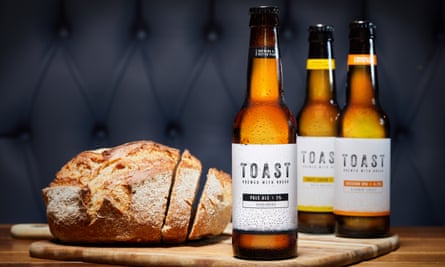
Tony’s Chocolonely is a chocolate brand that claims to be on a mission to stamp out slavery in the chocolate industry, launched in the UK last year and now on sale in supermarkets. It was the brainchild of the former broadcast journalist Teun van de Keuken (Tony), who discovered the scale of the cocoa industry’s child slavery problem when making a documentary and to raise awareness attempted to get himself arrested for eating “slave-made” chocolate. It is now the market leader in the Netherlands and selling strongly in the UK, with numerous flavour combinations, including dark meringue cherry. Since 5 August it is temporarily not shipping from abroad because of the hot weather, which may affect stock levels.
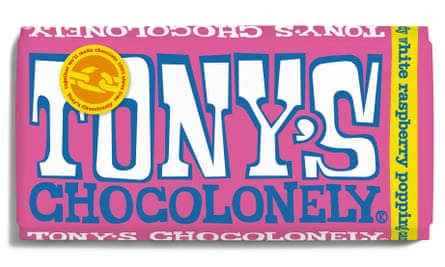
Oxfam sells coffees, chocolates and teas in its stores and online from suppliers who support the communities they buy ingredients from, including Divine and Cafédirect. This is part of its Source By Oxfam range of brand new products from ethical producers. The range also includes beauty products, cotton bags and jewellery and the charity has just added face masks. These are £3.99, plus delivery, with the money going to craftspeople in Asia who have lost they jobs because of the Covid-19 lockdowns in their country.
Gardening
Plastic plant pots are the scourge of the horticultural industry: most are hard to recycle as the scanning machines cannot pick up black plastic for sorting. There are alternatives, though, and the Hairy Pot Plant Company has turned to coir pots to sell its range of herbs and herbaceous plants. These are delivered to garden centres (the chains Hillier, Haskins and Notcutts are all stockists) in returnable wooden boxes and the plants are grown in peat-free compost.
The so-called hairy pots are made from coir, a byproduct of the coconut industry. They will last up to 12 months above ground and plants grown this way can be planted directly into the ground without being taken out of their pot. Coir has to be imported from tropical countries such as Sri Lanka, so it is not without a carbon footprint, but it is still a vast improvement on single-use plastic.
The Burford Garden Company stocks a range of hairy pot herbs for £5 each.
If you are looking for unusual crops to raise, the Agroforestry Research Trust sells a mind-boggling range of plants: ideal if you have cottoned on to the delights of growing your own food during lockdown.
The trust is a charity focusing on research and education about forest gardening; an eco-friendly, low-maintenance way of growing that focuses on perennial plants, so no need to worry about sowing seeds every spring. From dozens of different perennial onions to unusual trees such as Chinese dates and pecans, you will find something interesting to grow.
The trust is a carbon negative operation, storing more carbon on its three sites in Devon than it makes from all its activities. Plants sell like hot cakes, so even though they won’t be despatched until autumn or winter, it is wise to order now.
Not all cabbages are created equal: Real Seeds is a family-run seed firm based in Wales that specialises in open-pollinated, non-hybrid vegetable seed, which means you can save seed from anything you grow. It may seem like an act of self-sabotage for a seed company to provide seed-saving instructions with every order but the owners, Ben Gabel and Kate McEvoy, are passionate about teaching everyone these often-overlooked horticultural skills.
The packets are generously sized and reasonably priced and the range of varieties is wonderful, from oriental greens for salads and cooking to heirloom beans. There is still plenty of time to get started – check their summer sowing guide to find out what you can sow this month.
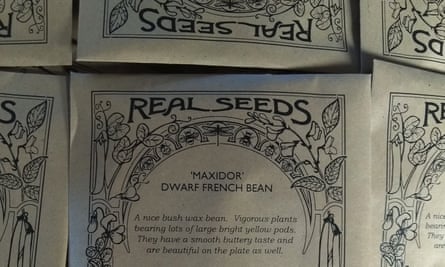
The campaign to ban peat from compost mixes gathers pace – and rightly so: the destruction of peat bogs in the UK and beyond is an environmental calamity. But finding good, peat-free compost can be hit and miss, which puts many gardeners off trying it. Dalefoot Compost’s range of peat-free compost mixes are superb quality and the price reflects that: you will pay £15.99 for a 40-litre bag of their original Lakeland Gold compost, which is for top dressing and mulching. Yes, you can buy much cheaper elsewhere but Lakeland Gold contains enough slow-release feed to last two years, so you won’t need to renew it after one season.
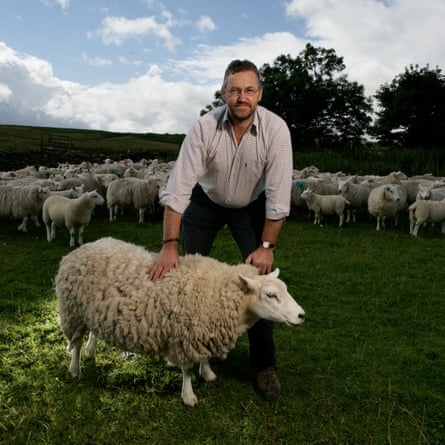
Dalefoot makes its compost mixes from bracken and adds sheep wool: both raw materials sourced from the fells around their farm in the Lake District. Their work to help restore peat bogs is to be commended and they are a living wage employer.

Household bills
A new breed of 100% renewable electricity tariff means homes can help support renewable energy projects while saving money on their bills.
It is worth choosing a 100% renewable energy deal carefully because not all clean energy deals are as clean as they seem. A report from Which? warned last year that “pale green” energy suppliers including Ovo Energy, Pure Planet and Green Star Energy all sell 100% renewable electricity without buying clean power from renewable energy projects.
A safer bet is to opt for energy suppliers whose green credentials match what customers would expect from a renewable electricity tariff. These include Ecotricity, Good Energy and Octopus Energy, which invest directly in renewable energy projects. A new renewable electricity tariff from Co-op Energy, known as Community Power, is powered entirely by community wind and solar projects from across the country.
Next time you need a key cut, a shoe repaired, some dry cleaning – or even some photos printed out – Timpson should be your destination – if you favour firms that tend to look after their staff.
Staff at the 2,000-plus chain are called colleagues, and get extra days off for birthdays, bereavements and a child’s first day at school. The company owns holiday homes for the use of employees and rewards them with £100 for giving up smoking.
Workers get the national living wage and a share of branch profits – plus a final salary pension scheme is in place: a huge rarity these days. Unlike many other firms, it pays its taxes and has received the Fair Tax Mark.
The family-owned company also has a policy of employing ex-offenders across the group – more than 10% of its workforce – and runs pre-release training in several prisons.
Technology
Fairphone is a Dutch electronics firm founded in 2013 and aimed at making the most ethical smartphone possible, helping people and planet in the process.
Fairphone’s initiatives mean workers get top-ups to the living wage, materials are sourced in the most ethical way, such as Fairtrade gold, and old devices are recycled to produce a phone that can be easily repaired, upgraded with new parts and should last at least five years. [see Q&A]
Fashion
Coronavirus has shed fresh light on human rights injustices at the heart of the fast fashion supply chains. The world needs underpants, so thank goodness for the burgeoning ethical knickers scene, within which You Underwear ticks a lot of feelgood boxes. You Underwear’s simple, stylish underpants are made from organic GOTS-certified Fairtrade cotton and produced by a certified ethical and sustainable manufacturer in India, using responsible low-impact dyes. They come in a reusable organic cotton bag and packaging contains no single-use plastic.
The company is dedicated to ethical marketing, too, using “real” people as models and has pledged never to PhotoShop imagery. For every pair of underpants purchased, You Underwear donates two pairs to Smalls for All, a charity that provides underwear to women and children living in poverty in the UK and across Africa.
Bralettes cost £28, boys’ shorts £15, bikini bottoms £12, and a thong is £10. That puts You Underwear at the upper mid-end of high street prices (a H&M bra top is £12.99; the mid-priced & Other Stories soft bra is £27, with matching briefs at £15), which may feel like a price worth paying for ethical, well-made underpants.
Thrift+ is a kind of online aggregate charity shopselling excellent-value secondhand high street clothing (a Topshop dress for £7, a Hobbs blouse for £8.50) as well as preloved mid-priced items (an Arket jumper for £24) and designer fare (a pair of Prada loafers for £90).
Donating is a smooth process: you send in a bag of clothes for the company to photograph and list, and nominate a charity to receive a proportion of the proceeds. Buying is simple, too: you can filter by size, price or brand and clothes are returnable, which is a rarity when buying second hand online.
Thrift+ charges a 33% fee for each sale. The donor can then choose whether to give all of the remaining 66% to charity or to split it evenly between their chosen charity and themselves (as site credits or John Lewis vouchers). It is a clever business model that supports the circular economy and raises money for charity but it also gives the seller a chance to recoup some of the money they paid for the item. Win, win, win.
Birdsong sells itself as the antidote to fast fashion, producing wilfully trend-free designs. In contrast to opaque, multinational fast fashion supply chains, workers are Londoners facing barriers to work, including adults with learning disabilities to refugees, all of whom are paid a living London wage.

Fabrics are sustainable, including the environmentally responsible Tencel and reclaimed textiles sourced by the charity Traid. Birdsong also works with a pensioners’ knitting community group in Enfield, whose members have elected to donate revenue from their items to charity.
Paying a London living wage isn’t cheap, so the clothes can’t be either, but sit in the Ted Baker/Arket/Karen Millen end of the high street bracket. An organic T-shirt embroidered with the legend Still European, for example, will set you back £36, a crochet bag hand-knitted from recycled denim wool is £45 while, a maxi wrap dress in reclaimed silk fabric, sewn by a group of women at the Stitches In Time community arts charity in Limehouse, is £165. That’s a special occasion dress that compares with Karen Millen’s Print Shirt Maxi Dress at £131.40 (reduced from £219).
By Miles Brignall, Jillian Ambrose, Rebecca Smithers, Guardian fashion editor Hannah Marriott, freelance gardens writer and podcaster Jane Perrone, Joanna Partridge, Samuel Gibbs, Patrick Collinson, Alex Mistlin and Hilary Osborne
Ethical living: five ways to make an impact
Ethical Consumer magazine is a great place to research anything you are buying – it has more than 125 product guides rating the ethics of different brands on a range of issues including climate impact and human rights. We asked the magazine’s news and features editor, Clare Carlile, for five ways you can change your shopping habits:
1. Spend less – and put the savings into an ethical bank account. It may seem obvious but asking “Do I really need this?” and reducing your consumption is the most direct way to reduce your environmental impact. By putting the savings made into an ethical bank, you can ensure that your money isn’t inadvertently funding fossil fuels or nuclear weapons, too.
2. Boycott unethical companies. It often costs nothing to avoid the worst offenders. Ethical Consumer has a boycott call against Amazon for its tax arrangements. The company has also been widely criticised for working conditions, including failing to provide safe conditions for its warehouse workers during the coronavirus crisis and firing employees in the US who have spoken out during the pandemic.
3. Buy secondhand tech and clothing. Each new phone or computer requires a plethora of natural resources, from conflict minerals to petrochemicals. Similarly, clothing is often manufactured with water-hungry cotton or petrochemical-based plastics. It is easy to instead buy refurbished tech online and secondhand clothes through swap shops, charity shops or online.
4. Change the way you travel. Running a car costs more than £3,000 and emits about 4.6 tonnes of CO2 on average per year. That is equivalent to almost six return flights from London to New York. Riding an electric or normal bike can hugely reduce your outgoings and climate impacts. By joining a carsharing club or using a carpool site such as BlaBlaCar, you can make more occasional journeys by car when you need to.
5. Go vegan or reduce your meat or dairy consumption. Tofu, lentils and black-eyed beans are all cheaper per 100g of protein than diced beef, a relatively cheap cut of meat. They are also much less carbon intensive: someone who eats a lot of meat will have two and a half times the dietary carbon footprint of someone who is vegan. If you ensure you have a balanced diet and keep up your levels of vitamin B12, going vegan can be a way to address your animal rights as well as environmental impacts.
Shop local: support small businesses
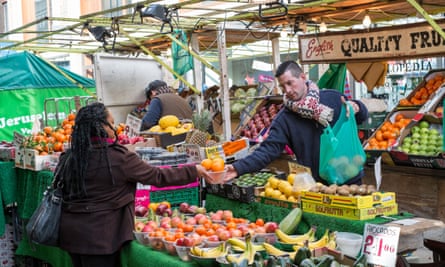
During the lockdown many of us rediscovered the local grocers and hardware stores we may have got out of the habit of visiting. Many kept trading, and managed to supply much-needed toilet roll, pasta and other staple supplies to customers. According to Barclaycard, spending was up by 38% in April at specialist off-licences, greengrocers, independent convenience stores, butchers and bakeries while it fell elsewhere. At the same time more than half of consumers told the credit card provider that the pandemic had made them realise how much they valued these shops.
And there is good reason to keep supporting local stores when you can. They are unlikely to have complex tax arrangements or to move profits overseas, and owners and staff will probably live nearby, so more money is likely to stay in your local economy. Shopping locally also means you are less likely to use a car, which is good for the environment.
Last year’s local shop report by the Association of Convenience Stores found that its 46,388 members employed about 405,000 people in the UK. Staff typically spent 14 minutes getting to work, and 53% travelled on foot. Many businesses had spent money supporting community events or sponsoring local sports teams.
It is hard to find up-to-date estimates of the economic impact of shopping locally, but research done several years ago by the Federation of Small Businesses found that for every £1 spent with a small or medium-sized business, 63p went back into spending in the area. This compared with 40p in every £1 spent with larger businesses.
Prices can be as good, if not better, than the supermarkets on some products. Small businesses can be nimble and take advantage of good deals from their suppliers. If they specialise in any particular item, they may have a much larger range than chain stores carry, and offer goods at a wide range of price points. And if they don’t have what you want you can always ask – they may be able to get it in and save you a delivery charge.
